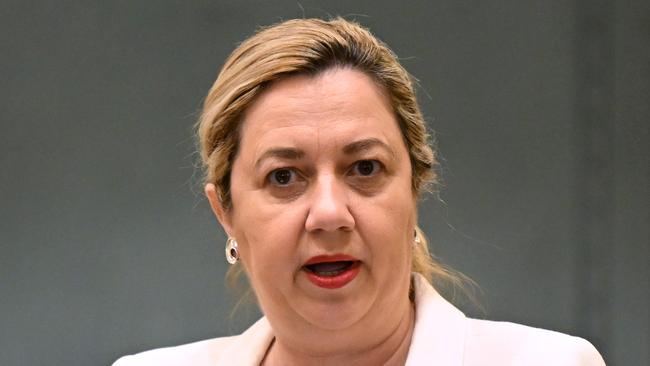Queensland’s Path to Treaty inquiry ‘can compel truth’
Queensland’s truth-telling inquiry will have the power to compel government department chiefs to front public hearings and be interrogated under oath.

Queensland’s truth-telling inquiry will have the power to compel state government department chiefs to front public hearings and be interrogated under oath about the devastating impact of colonisation on Indigenous people.
Introducing the state’s Path to Treaty legislation into parliament on Wednesday, Premier Annastacia Palaszczuk said the three-year inquiry would uncover difficult and traumatic truths about the history of Queensland.
“This is not about guilt. This is about revealing the truth of our state, denied and buried for too long,” Ms Palaszczuk said.
The bill creates the truth-telling and healing inquiry, in which a five-member team will travel the state and take evidence from Aboriginal and Torres Strait Islander communities about the historical and ongoing effects of colonisation.
The inquiry will operate in a non-legalistic way but it will have strong powers, including the ability to force government chief executives to give evidence about the past behaviour of the state, and to compel the production of previously secret documents from public institutions.
Ms Palaszczuk said the new legislation would also establish a First Nations Treaty Institute, which would develop a framework to assist First Nations people conduct treaty negotiations.
“This is our chance to do what we should have done two centuries ago,” she said.
The legislation also removes outdated and racist provisions in the state’s statute books, including the state singling out Indigenous people to manage their savings and bank deposits without their consent.
Interim Truth and Treaty Body co-chair Cheryl Buchanan, a proud Guwamu woman from southwest Queensland, said it was time for “black control of black affairs”.
“That’s where we want to be as First Nations, whether we’re Aboriginal or Torres Strait Islander,” she said.
“It used to be self-determination that we used to go march on the streets for, and that’s what we need.”
Ms Buchanan said it was likely there would be treaties between the state and many different First Nations groups, and it would be up to individual groups as to what the treaties’ terms would be.
She said some of the government funding could be used to reunite families and clan groups who had spread out geographically over generations, to come together for meetings to discuss what form treaties should take.
ITBB board member Seleena Blackley, a 19-year-old youth worker and Kalkutungu woman from Mount Isa, said she graduated from high school only in 2020 but there was very little in the curriculum about First Nations culture and history.
Ms Blackley said her cultural knowledge came from her family, both sides of which were “greatly affected” by the Stolen Generations. “That’s one of the things that truly is going to change for young people (through the treaty and truth-telling process) … the education, the awareness,” she said.
“There’s no better time to be a young person and to really get amongst it.”
Aunty McRose Elu, who was born on Saibai Island in the Torres Strait and grew up in Seisia on the tip of Cape York under Queensland’s racist and oppressive Aboriginal Protection Act, said she never thought she would live to see the day treaty legislation was introduced in Queensland.
Dr Elu said it would be distressing for some Indigenous people to tell their stories to the inquiry.
“It’s going to be difficult for people to talk about it and at the same time, you are releasing the pain and distress, and acknowledging it,” she said.
Treasurer Cameron Dick told parliament the process would be backed by a $300m Path to Treaty fund, which would equate to $20m a year for the institute and the inquiry.
Mr Dick said no other jurisdiction in Australia had a sustainable funding model to support the treaty process.




To join the conversation, please log in. Don't have an account? Register
Join the conversation, you are commenting as Logout